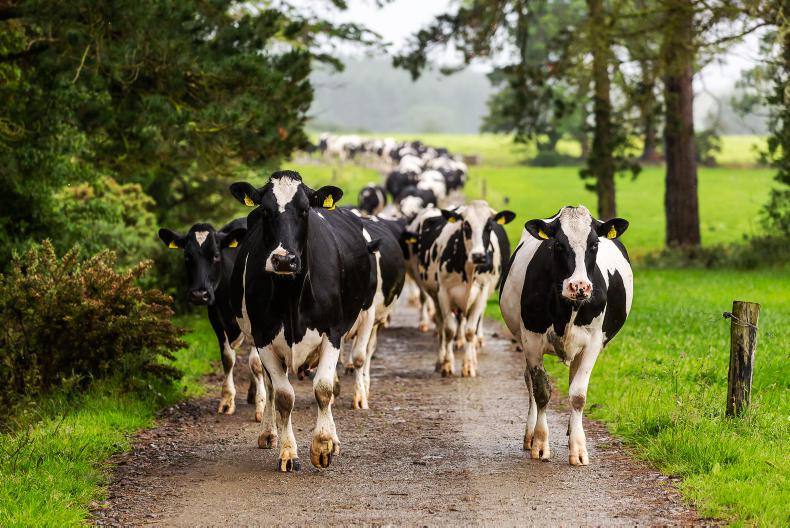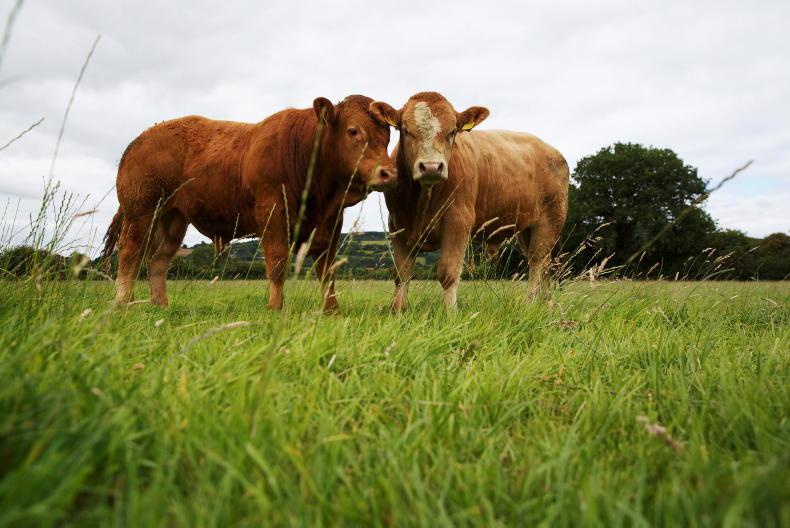The digitalisation of agriculture continues to accelerate, with developments in a range of technologies including blockchain, artificial intelligence (AI) and the internet of things (IOT).
The question now arises, however, as to what these technologies are and how they can improve the profitability and sustainability of agriculture.
The VistaMilk SFI Research Centre held a masterclass on blockchain in agriculture earlier in the year aiming to provide a clear and comprehensive understanding of what blockchain actually is and to address some of the mystery surrounding it.

Blockchain is among the many technologies which could become widely used on farms.
In its simplest form, blockchain is a public digital ledger of transactions that records information in a way that makes it difficult to hack or alter. Blockchain has the potential to be particularly useful in agriculture to consolidate and validate information on produce from farm all the way through to the consumer.
Key questions
Some of the questions addressed in the masterclass included:
Can it be utilised by everyone? How complex is it to set up? What are the most appropriate applications of it in agriculture? Value to farmers
For many of us, the most important question is what’s in it for farmers? Brendan Allen, programme manager at Aginnovate, based in the National University of Galway, and part-time farmer, described what blockchain could add to his beef enterprise.
Brendan began by outlining the current beef supply chain, highlighting the lack of power that farmers possess.
He also highlighted the most important factors that consumers look for when making a choice on the food they purchase.
Being the owner of a farm shop, Brendan has seen how consumers prioritise trust and traceability above many factors. He said building a direct relationship with the consumer to demonstrate the high levels of compliance on-farm can be where blockchain plays its part in making Irish agriculture more sustainable.
The current beef supply chain does not facilitate a direct relationship between the producer and the consumer, reducing farmer power and limiting their ability to be economically sustainable.
By leading the utilisation of blockchain technology, through recording antibiotic use, animal welfare records and climate change impacts, farmers can build a direct relationship with their consumer and, in theory, increase their power in the supply-chain.
Integration
Karl O’Connell, integration manager at ICBF, built on Brendan Allen’s presentation by exploring where blockchain could be added to the current structures. ICBF manages the national livestock database in Ireland.
In other countries, where no ICBF exists, the opportunity and need for blockchain is obvious, but how can blockchain be integrated within the Irish model? Once again, the consumer is the key.
Currently, almost all stakeholders feed into the ICBF database in some way, all except the consumer. This omission provided an opportunity for ICBF to explore how blockchain could be used to potentially include consumer feedback through undertakings such as the meat eating quality project.
Consumers, by scanning a QR code on the meat package, are invited to provide feedback on their eating experience which, when combined with ancillary information in the ICBF database, can create a picture of which family lines produce the best-tasting steak.
Learning curve
The issue with new technology is that the learning curve can often be steep. However, Karl explained that tools and language do not need to change from those which we are already using.
He outlined some initial learnings from ICBF’s proof of concept and concluded that while there is a lot of hype surrounding blockchain, it can add value as more real-use cases emerge.
The ICBF sees blockchain being incorporated into farms of the future, making them small and smart, while also providing traceability and consumer feedback.
Key to all of the presentations was the issue of trust and whether blockchain really can help with trustworthiness. Unfortunately, when speaking of trust, this isn’t a yes or no answer.
Paul Ryan, CEO of Trust Codes, explained that blockchain is unable to do much for consumer trust at this point as the technology being used isn’t mature enough to make any guarantees. Having a shared record does not guarantee truthful transactions. It’s important for us to understand that while this could eventually be something quite promising and reliable, it’s not quite there yet.
The keynote speaker on the day was John Keogh, founder and managing principal at Shantalla, a Canadian-based company which provides advisory and contract research services.
John gave a perspective which placed blockchain in the context of other crucial food supply chain technologies such as artificial intelligence, machine learning, and the internet of things.
He said the big problem with transparency and visibility is that these terms are overused and abused and they can be taken for granted when blockchain technology is mentioned.
As the technology matures, these issues can be overcome but it will only ever be as good as the data allows it to be.
To overcome this issue, standards and applying the appropriate models will be crucial to building trust in the technology.
Researchers
VistaMilk researchers John Breslin and Subhasis Thakur from the National University of Galway are working in the area of blockchain and have published a number of papers in this area.
After a day of interesting presentations, there is no doubt that blockchain technology has the potential to radically change the Irish food supply chain but it is likely to be another tool at our disposal rather than a silver bullet.
For farmers and those involved in the agri-food industry, it’s a case of watch this space.
The digitalisation of agriculture continues to accelerate, with developments in a range of technologies including blockchain, artificial intelligence (AI) and the internet of things (IOT).
The question now arises, however, as to what these technologies are and how they can improve the profitability and sustainability of agriculture.
The VistaMilk SFI Research Centre held a masterclass on blockchain in agriculture earlier in the year aiming to provide a clear and comprehensive understanding of what blockchain actually is and to address some of the mystery surrounding it.

Blockchain is among the many technologies which could become widely used on farms.
In its simplest form, blockchain is a public digital ledger of transactions that records information in a way that makes it difficult to hack or alter. Blockchain has the potential to be particularly useful in agriculture to consolidate and validate information on produce from farm all the way through to the consumer.
Key questions
Some of the questions addressed in the masterclass included:
Can it be utilised by everyone? How complex is it to set up? What are the most appropriate applications of it in agriculture? Value to farmers
For many of us, the most important question is what’s in it for farmers? Brendan Allen, programme manager at Aginnovate, based in the National University of Galway, and part-time farmer, described what blockchain could add to his beef enterprise.
Brendan began by outlining the current beef supply chain, highlighting the lack of power that farmers possess.
He also highlighted the most important factors that consumers look for when making a choice on the food they purchase.
Being the owner of a farm shop, Brendan has seen how consumers prioritise trust and traceability above many factors. He said building a direct relationship with the consumer to demonstrate the high levels of compliance on-farm can be where blockchain plays its part in making Irish agriculture more sustainable.
The current beef supply chain does not facilitate a direct relationship between the producer and the consumer, reducing farmer power and limiting their ability to be economically sustainable.
By leading the utilisation of blockchain technology, through recording antibiotic use, animal welfare records and climate change impacts, farmers can build a direct relationship with their consumer and, in theory, increase their power in the supply-chain.
Integration
Karl O’Connell, integration manager at ICBF, built on Brendan Allen’s presentation by exploring where blockchain could be added to the current structures. ICBF manages the national livestock database in Ireland.
In other countries, where no ICBF exists, the opportunity and need for blockchain is obvious, but how can blockchain be integrated within the Irish model? Once again, the consumer is the key.
Currently, almost all stakeholders feed into the ICBF database in some way, all except the consumer. This omission provided an opportunity for ICBF to explore how blockchain could be used to potentially include consumer feedback through undertakings such as the meat eating quality project.
Consumers, by scanning a QR code on the meat package, are invited to provide feedback on their eating experience which, when combined with ancillary information in the ICBF database, can create a picture of which family lines produce the best-tasting steak.
Learning curve
The issue with new technology is that the learning curve can often be steep. However, Karl explained that tools and language do not need to change from those which we are already using.
He outlined some initial learnings from ICBF’s proof of concept and concluded that while there is a lot of hype surrounding blockchain, it can add value as more real-use cases emerge.
The ICBF sees blockchain being incorporated into farms of the future, making them small and smart, while also providing traceability and consumer feedback.
Key to all of the presentations was the issue of trust and whether blockchain really can help with trustworthiness. Unfortunately, when speaking of trust, this isn’t a yes or no answer.
Paul Ryan, CEO of Trust Codes, explained that blockchain is unable to do much for consumer trust at this point as the technology being used isn’t mature enough to make any guarantees. Having a shared record does not guarantee truthful transactions. It’s important for us to understand that while this could eventually be something quite promising and reliable, it’s not quite there yet.
The keynote speaker on the day was John Keogh, founder and managing principal at Shantalla, a Canadian-based company which provides advisory and contract research services.
John gave a perspective which placed blockchain in the context of other crucial food supply chain technologies such as artificial intelligence, machine learning, and the internet of things.
He said the big problem with transparency and visibility is that these terms are overused and abused and they can be taken for granted when blockchain technology is mentioned.
As the technology matures, these issues can be overcome but it will only ever be as good as the data allows it to be.
To overcome this issue, standards and applying the appropriate models will be crucial to building trust in the technology.
Researchers
VistaMilk researchers John Breslin and Subhasis Thakur from the National University of Galway are working in the area of blockchain and have published a number of papers in this area.
After a day of interesting presentations, there is no doubt that blockchain technology has the potential to radically change the Irish food supply chain but it is likely to be another tool at our disposal rather than a silver bullet.
For farmers and those involved in the agri-food industry, it’s a case of watch this space.







 This is a subscriber-only article
This is a subscriber-only article










SHARING OPTIONS: